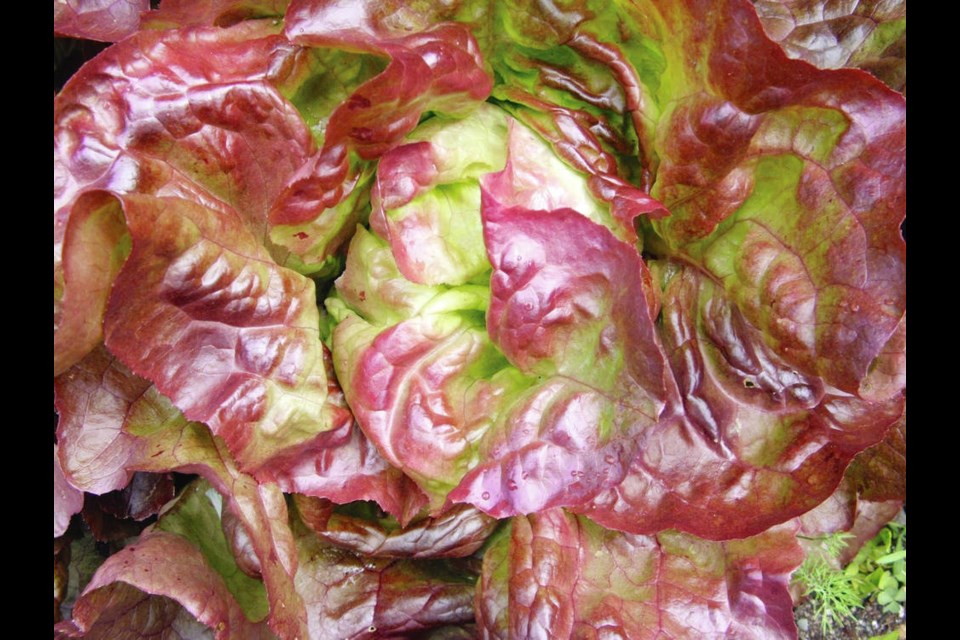I’m not much given to navel- gazing angst, but I must admit that the bout of cold, snowy weather last month reminded me how much I rely on time in the garden to maintain a sense of mental and physical well-being.
The first day out in the vegetable plots, two weeks ago, was a delight. I dug up carrots, parsnips, beets and daikon radishes to package and give to a gardening friend for her birthday. I give only the most glamorous of gifts. Back indoors, I steamed a batch of beets and made enough spiced beets to add a container to the birthday box, along with a card that said: “Gardeners have the best thyme.”
Apart from the root vegetables and kale in the garden, stored and frozen fruit and vegetables have kept me supplied with a good portion of my groceries. The winter has seemed like a time of plenty as I’ve feasted also on home-grown sweet potatoes, onions, plump garlic bulbs, and squash.
Squash. In last year’s William Dam Seeds catalogue I found a winter squash listing that was hard to resist. Mashed Potatoes is a white acorn squash with white flesh that is like mashed potatoes when baked and fluffed. I recently enjoyed the last one, the cooked flesh whipped with butter and dusted with smoked paprika. A tasty alternative to potatoes.
Even more intensely delicious has been Black Forest, a kabocha squash with the flattened pumpkin shape and dark green skin characteristic of the type. The dark orange flesh is the sweetest I’ve ever tasted in a winter squash. The flavour has hints of sweet potato and roasted chestnuts. This squash has produced the most richly flavoured “pumpkin” pies I’ve ever produced, and chunks of the flesh, tossed in oil and roasted, were a real treat.
Seeds for Black Forest are listed in the Salt Spring Seeds and Full Circle Seeds online catalogues.
Reminders. Spring will officially begin in just two weeks and gardeners will be “springing” into action this month. A few projects to consider:
• Plan a family vegetable plot. Find a location in full or nearly full sun, where the ground drains well of excess moisture. Clear the area, dig it free of rocks and debris, and amend the soil with a nourishing compost. Most soils will need liming, except where potatoes are to grow. Space is limited in most home gardens. Plan on growing family favourites, especially ones that are best eaten freshly harvested, like lettuce and other leafy greens.
• Finish pruning. After they have finished blooming, prune winter jasmine and forsythia, but wait until their post-bloom period to prune later spring-flowering shrubs such as the May-flowering lilac.
• Activate compost heaps. Fluff them up to introduce air, make sure they are kept only modestly moist, and loosely cover them with clear plastic for the deepest possible penetration of warmth into the heap. Forking in young, green weeds or fresh grass clippings will further help to hasten the composting process.
Hellebore Sunday. The Horticulture Centre of the Pacific, 505 Quayle Rd. in Saanich, is hosting Hellebore Sunday on March 7, 12 to 3 p.m. A selection of hellebores and their companion plants will be for sale. Access to the gardens is free. Proceeds go into the maintenance and development of the gardens. Standard COVID protocols will be in place.
Peninsula meeting. The Peninsula Garden Club is resuming its Speaker Series using Zoom on the second Monday of most months. The March 8 speaker, Don Hare, will be discussing “Invasive Plants and Weeds” at 7 p.m. New members are welcome. Membership is required to acquire a Zoom link for the speakers’ presentations. Check out the club’s list of speakers and how to acquire membership at peninsulagardenclub.ca.
HCP courses. The Horticulture Centre of the Pacific is offering the following online classes on Zoom. For details and online registration go to hcp.ca/events. The site’s home page also lists courses. Register online or by phone: 250-479-6162.
• Plant Identification and Culture, Saturday, March 13, 1 to 4 p.m. Diane Pierce will introduce 25 new plants with their descriptions, cultural requirements, general maintenance and landscape uses. This is an ongoing, monthly class. Members $35, others $45.
• Watercolours with Richard Wong — Arbutus trees, March 18, 6 to 8 p.m. A supply list will be emailed to participants. Fee $20.



